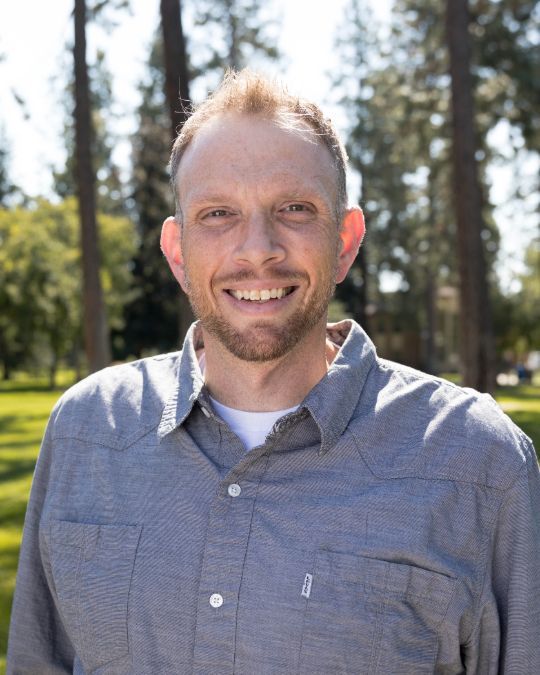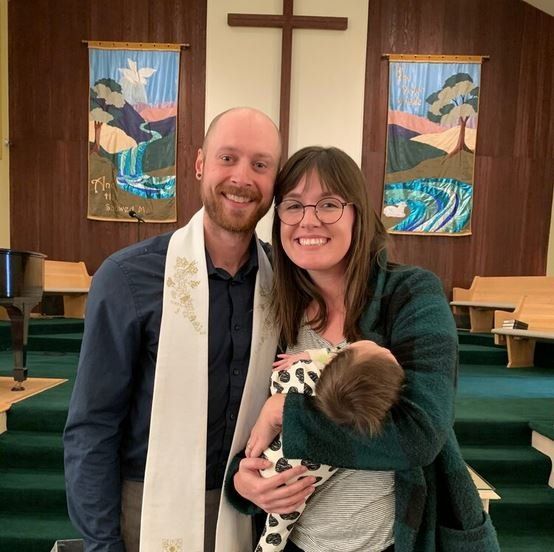Decline in Christianity challenges Spokane churches to reimagine spiritual engagement
News Story by Caleb McGever | FāVS News
Religious affiliation has been on the decline and may continue declining, according to a 2025 report published by Pew Research Center. This leaves Spokane churches with a dilemma: How do they adapt to shrinking congregations?
The Pew Research Center’s report on the 2023-24 Religious Landscape Study, published in February of this year, declares in its title that the “Decline of Christianity in the U.S. Has slowed, May Have Leveled Off.” The report identifies evidence of a decline in American religion lasting from 2007 to 2019, when the percentage of U.S. adults who identify as Christian dropped steadily from 78% to 63%. From 2020 onward, it reports that the percentage stabilized at around 63%.
However, the report suggests that the stability might not last as younger, less religious generations gradually replace the older, more religious ones.
The study reports that for young adults ages 18-24 and elderly adults over 74, 46% of young adults identify as Christian as opposed to 80% of elderly adults. For these same groups, 27% of young adults pray daily as opposed to 58% of elderly adults, and 25% of young adults say they attend religious services at least monthly as opposed to 49% of elderly adults.
Church attendance declines in Spokane — with some key exceptions
Mark Killian, an associate professor of sociology at Whitworth University and consultant for Whitworth’s Resilient Church Initiative, said that Spokane’s churchgoing trends generally match the trends of decline described in Pew’s report.
However, Killian said that megachurches are an exception to the trend.

“One of the things, just in all communities, is that the churches who aren’t losing people are megachurches. And historically what the data shows is that they’re the churches that actually are still technically growing,” he said.
Another exception to the trend is non-denominational churches.
Pew’s report identified “nondenominational Protestantism” as “the only Protestant family of denominations that is larger as a share of the U.S. population in the new survey than it was in the first [Religious Landscape Survey].” Nondenominational Protestantism rose from 6.2% of the U.S. in 2014 to 7.1% in 2024.
According to the 2020 United States Religious Census, there are 519 church congregations in the Spokane and Spokane Valley Washington Metro Area. The largest group of churches of this group is nondenominational churches, with 90 churches.
However, attendance data isn’t always the most important indicator of a church’s health, according to Killian. He explained that tracking megachurch attendance might be misleading because, while attendance is a helpful statistic, it does not account for levels of participation.
“Commitment can fuel vitality as much as growth, right?” Killian said. “You can be a small congregation, but highly committed, and you can be a large congregation, has lots of joiners, but not a whole lot of commitment.”
Lower attendance might lead to difficult financial decisions
“Obviously, if you have declining attendance, you have declining budgets,” said Killian.
Drew Peterson, a pastor at Knox Presbyterian Church and the land stewardship guide and cyclical co-director with the Presbytery of the Inland Northwest, said that, as churches are faced with lower attendance and lower funds, they might start to struggle to maintain their financial assets.
“How is it that the church of today, that is declining in its membership and in its budget, but still has these tremendous assets in these property buildings, parking lots, megachurches own vacant parcels of lands that are adjacent to their buildings,” Peterson started. “How? How can we steward these to accomplish the mission of Jesus Christ in the world?”
Churches are thinking about land stewardship
In the face of congregational decline, Peterson sees opportunity for the church to grow in a new way.
“Whenever we hear information and see statistics about decline, it tends to put us on our heels a little bit. We feel defensive, or we feel like there’s something wrong that we need to fix in order to go back to the way things were, and I’m not convinced that that’s the right approach here,” he said.
For churches that are not able to maintain their assets, Peterson suggested repurposing church resources towards practical methods of community engagement. He highlighted churches like Bethany Presbyterian, where the congregation chose to build affordable housing units to replace a large portion of the church after it was damaged in a fire.
“Throughout history when there’s a community need, churches are the ones that have responded,” he said.
“Back in the 1970s when HUD housing and urban development from the government said, we need more affordable housing, it was churches that really took the call first in Spokane,” he continued. “You see that in Richard Allen court, which is at Bethel AME, and you see that at Manito Gardens, which is at Manito Presbyterian Church. There are several of these. You see evidence of churches having stewarded their land for the good of people living on the margins in their communities.”
At churches like Bethany Presbyterian, churches are changing the ways they think about land stewardship. Killian said that the church’s willingness to close or repurpose their land is a relatively unique aspect of Spokane.
“I see that in other areas, but I do think compared to what I’ve seen in other areas, Spokane is a little more ahead of the curve,” he said.
Spirituality is not in decline
Although Pew reported a decline in religious participation, they also reported that “large majorities of Americans have a spiritual or supernatural outlook on the world.”
According to the survey, “86% believe people have a soul or spirit in addition to their physical body,” “83% believe in God or a universal spirit,” “79% believe there is something spiritual beyond the natural world, even if we can’t see it” and “70% believe in an afterlife (heaven, hell or both).”

Peterson suggested that the steady popularity of spirituality in the U.S. still highlights the important role of the church.
“If people are declining in membership in belonging to the institutional church, but still are demonstrating a thirst for something spiritually meaningful, I think that what we need to do is help people to integrate, to connect what they are already doing with their spiritual lives,” he said.
Brianna Dilts, the Eastern Washington representative for the Faith Action Network (FAN), explained that FAN’s community engagement still works to include people who don’t participate in a church.

“We have been, in the last few years, getting more into being more inclusive of people of conscience,” she said, referring to people wanting to engage with FAN’s interfaith community advocacy without participating in organized religion. “Because there are many people who are … spiritual or religious, don’t identify with Christianity or don’t attend a church regularly that also have a deep sense of justice and want to advocate.”
The role of religious “nones”
“The long-term decline in the Christian share of the population and growth of religious ‘nones’ is demographically broad-based,” said Pew’s report. “There are fewer Christians and more ‘nones’ among men and women; people in every racial and ethnic category; college graduates and those with less education; and residents of all major regions of the country.”
Killian said origins of religious disaffiliation can be understood better by looking at expanded geographical mobility and fertility rates. However, he added that the rise of religious “nones” who also identify as spiritual might also correlate with the rise of disaffiliation with organized religion.
Dilts said that in her experience working with young people, disaffiliation with organized religion is often related to its conduct.
“Part of the decline in young people identifying as Christian, attending churches, [is] the lack of a social mission from big communities. Christian churches, specifically,” said Dilts. She added that religious trauma also plays an important role.
Peterson said that the church might still be able to connect with the increasing number people who aren’t religious — if it is willing to reform itself and foster connection in new ways.
“If the institutions of the conventional institution of the church is tired and is becoming increasingly irrelevant for a large number of people, then it might mean that we need to start some new ones,” he said. His examples of “new ones” included nonprofits like Feast World Kitchen, Side by Side Ministries and Growing Neighbors.
“We consider these to be new expressions of church that meet people who have that spiritual longing and meet them in a time and a place when they may otherwise not be inclined to go into a conventional church building or be a part of a conventional church worship service,” he said.











